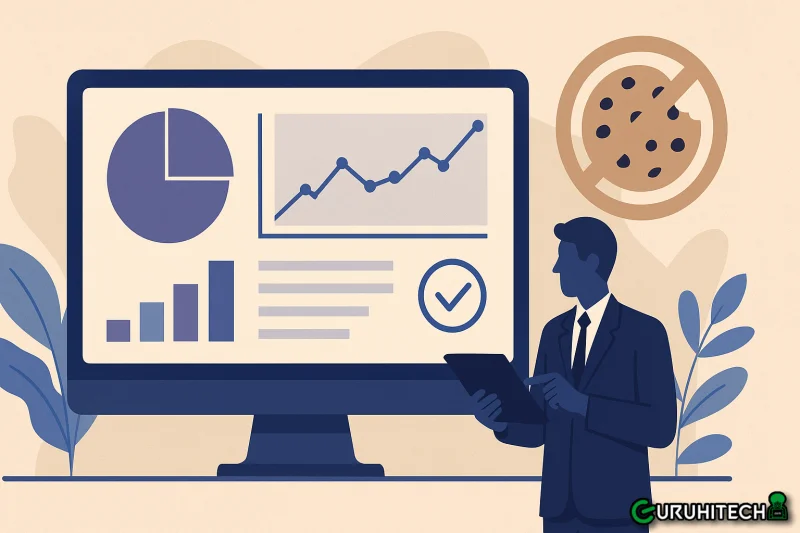Why Every Business Needs a Cookieless Analytics Platform

The shift in digital marketing is obvious. Businesses cannot rely on third-party cookies to track customer activity anymore. Privacy regulations, browser restrictions, and customer expectations have changed how data is collected and used. To continue tracking performance and making choices, businesses want a cookieless analytics platform. These tools offer an ethical and dependable solution to understand user behavior without depending on outdated tracking methods.
What Makes a Cookieless Analytics Platform Different
A cookieless analytics platform does not use cookies to collect and analyze user data. Instead, it uses different techniques such as first-party data, session-based tracking, and anonymous identifiers. This ensures that businesses can monitor user trips without violating privacy policies.
Unlike traditional systems, a cookieless tracking system can capture data in real time and interconnect actions across devices. It makes way for a more accurate understanding of behavior while remaining compliant with standards like GDPR and CCPA.
The key distinction is in control. A business owns the data it collects via a cookieless analytics platform, whereas cookies rely on third-party services that may no longer be available or permitted.
Why Businesses Cannot Rely on Cookies Anymore
There are various reasons why organizations should no longer rely on cookies.
- Privacy restrictions: Governments have imposed stringent requirements for how user data is gathered, maintained, and shared. Cookies frequently do not match these conditions.
- Browser restrictions: Major browsers like Chrome, Safari, and Firefox have reduced or eliminated support for third-party cookies. This means that companies cannot rely on them for long-term tracking.
- Consumer expectations: Users prefer transparency and authority over their data. They favor brands that protect their privacy.
- Data accuracy: Cookies often get banned, removed, or expire prematurely. This makes the data incomplete and unreliable.
Without alternatives, businesses risk losing data on customer behavior. A cookieless analytics platform closes this gap by providing tracking solutions that work on all browsers and devices.
Functions of a Cookieless Analytics Platform
A modern cookieless analytics platform has numerous capabilities that make it valuable:
- First-party tracking: Tracks visitors using domains and systems owned by the business, eliminating the need for a third-party.
- Cross-device attribution: Linking user activity on mobile, desktop, and other devices.
- Real-time reporting: Provides information quickly, allowing teams to change campaigns fast.
- Data compliance: Ensures that organizations comply with global privacy rules by acquiring data ethically.
- Audience segmentation: Enables data to be broken down into clear groups for targeting and personalization.
- Integration with Marketing Tools: Integrates with CRM, advertising, and automation platforms to provide easy processes.
How to Choose the Best Cookieless Tracking Solution
Before implementing a solution, businesses should thoroughly consider all available possibilities. When deciding on the best cookieless tracking platform, consider the following factors:
- Ease of integration: The platform should be compatible with existing systems such as CRMs, email tools, and advertising platforms.
- Data ownership: Select a system in which the business controls and stores the data.
- Accuracy: The solution should monitor consumers consistently across channels and devices.
- Compliance: Ensure that the cookieless analytics platform complies with GDPR, CCPA, and other privacy requirements.
- Flexibility: As the business grows, the solution should be capable of handling massive amounts of data.
- Support and training: Good onboarding and customer service facilitate adoption.
A detailed examination of these aspects helps in determining the most effective cookieless tracking platform for long-term performance.
Challenges in Moving to a Cookieless Tracking Solution
Switching from cookies to a cookieless analytics platform is not always easy. Businesses may confront a variety of challenges:
- Migration of data: Historical data obtained via cookies may not be compatible with new systems.
- Learning curve: Teams require training to become accustomed to new dashboards, features, and workflows.
- Integration issues: Some existing marketing tools may not work seamlessly with the new platform.
- Initial expenditures: Implementing a cookieless tracking solution necessitates investing in software and resources.
- Resistance to change: Teams accustomed to conventional cookie-based approaches could require some time to readjust.
Despite these challenges, the advantages of using a cookieless analytics platform outweigh the drawbacks. Early adopters also get a competitive edge.
Best Practices for Implementation
To get the most out of a cookieless analytics platform, businesses should follow these best practices:
- Begin early: Do not wait until cookies are completely phased out. Start the transition right away to stay ahead.
- Train teams: Hold training sessions to ensure that marketing and sales staff can use the platform properly.
- Test in stages: Introduce the cookieless tracking system gradually, beginning with trial campaigns.
- Use first-party data: Gather information directly from customers via forms, subscriptions, and comments.
- Focus on compliance: Conduct regular audits to ensure that all data collection follows privacy requirements.
- Review and optimize: Continuously monitor performance and make adjustments to achieve better results.
Conclusion
The removal of cookies affects how organizations track and understand their clients. Without a reliable solution, data will be incomplete, resulting in poor marketing performance. A cookieless analytics platform has capabilities for collecting accurate, compliant, and real-time data. It allows businesses to get control over their data and build strong consumer relationships.
Selecting the best cookieless tracking solution may require some work, but it is critical for long-term success. Businesses that adopt best practices early on can overcome difficulties and continue to flourish in a privacy-conscious environment.
Ti potrebbe interessare:
Segui guruhitech su:
- Google News: bit.ly/gurugooglenews
- Telegram: t.me/guruhitech
- X (Twitter): x.com/guruhitech1
- Bluesky: bsky.app/profile/guruhitech.bsky.social
- GETTR: gettr.com/user/guruhitech
- Rumble: rumble.com/user/guruhitech
- VKontakte: vk.com/guruhitech
- MeWe: mewe.com/i/guruhitech
- Skype: live:.cid.d4cf3836b772da8a
- WhatsApp: bit.ly/whatsappguruhitech
Esprimi il tuo parere!
Ti è stato utile questo articolo? Lascia un commento nell’apposita sezione che trovi più in basso e se ti va, iscriviti alla newsletter.
Per qualsiasi domanda, informazione o assistenza nel mondo della tecnologia, puoi inviare una email all’indirizzo [email protected].
Scopri di più da GuruHiTech
Abbonati per ricevere gli ultimi articoli inviati alla tua e-mail.
